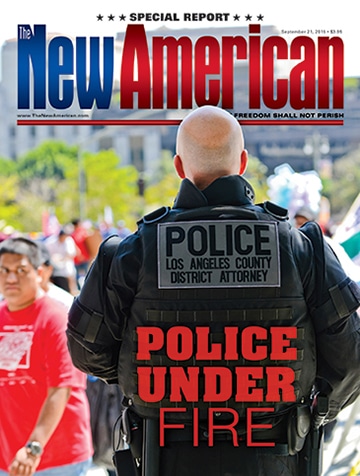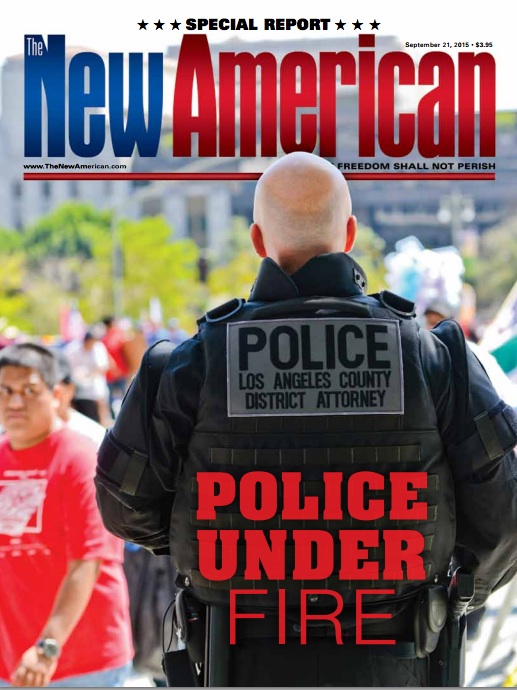Sheriffs: the Key to Local Control
As one by one the parchment barricades protecting the people from the destructive growth of government are being attacked and overrun, there is one key group of officials who are stepping into the breach — county sheriffs.
On August 6 of this year, a sheriff with an eye on the Constitution and his fellow citizens stood steadfastly against the federal usurpation in defense of one of the residents of his county.
On that day, about 100 residents in Priest River, Idaho, gathered outside the home of a U.S. Navy veteran to protest an effort by the federal government to confiscate the man’s guns.
Idaho state representative Heather Scott said that the veteran, John Arnold, received a letter from the Veterans Affairs office “warning him that he cannot possess or purchase firearms.”
Remarkably, found among the throng of protesters was Bonner County Sheriff Daryl Wheeler. Wheeler “promised to stand guard against any federal attempts to remove Arnold’s guns,” the Associated Press reported.
“I took an oath to uphold the U.S. Constitution and uphold the laws of Idaho,” Wheeler said, as quoted in the AP story. “This seemed appropriate to show my support. I was going to make sure Mr. Arnold’s rights weren’t going to be breached.”
Earlier this year, the Helena (Montana) Independent Record reported on the effort of the state legislature to protect not only the sovereignty of the state, but the status of sheriff as the highest constitutional law-enforcement authority:
House Bill 274, the “sheriffs first” measure, says federal agents may not make an arrest, search or seizure in the state without the written permission of the sheriff — or risk prosecution by the county attorney for kidnapping, trespass, theft or homicide.
“This bill is well intentioned,” said sponsor Rep. Nancy Ballance, R-Hamilton. “Federal overreach is a real concern. Our people want to know there is a last line of defense when the feds come into their county. And that’s the sheriff.”
Sheriffs nationwide are awakening to the reality of their role as the ultimate constitutionally elected county executive. Once aware of this role and its responsibilities, the lawmen are stepping up in defense of the Constitution.
Elected sheriffs, as the top law-enforcement officers within their counties, work for the citizens and taxpayers in their jurisdictions, not the federal government. This is a critical distinction in the era of rapid federalization (nationalization of local law enforcement).
One group of lawmen in particular has provided inspiration and information to county sheriffs willing to be an impenetrable roadblock on the federal government’s path toward absolutism: the Constitutional Sheriffs and Peace Officers Association (CSPOA).
The CSPOA’s two-fold mission is to save America and to get enough people involved in that fight to make the dream a reality. The organization’s website describes precisely how they propose to achieve this lofty and laudable goal:
The answers lie within our grasp and come from the foundation of our country. The principles are embodied within the Declaration of Independence and outlined in the Constitution.
Yes, America is in deep, deep trouble. The good news is that there is hope and my [CSPOA founder, former Arizona Sheriff Richard Mack’s] victory at the US Supreme Court proves that it only takes a few to stand to make monumental changes. We do not have to stand by and watch while America is destroyed from within. If our counties, cities, and states and all local officers keep their oaths to protect us from tyranny, we can win this battle to take our country back.
This is our plan, our goal and our quest. We are forming the Constitutional Peace Officers Association which will unite all public servants and sheriffs, to keep their word to uphold, defend, protect, preserve, and obey the Constitution of the United States of America. We already have hundreds of police, sheriffs, and other officials who have expressed a desire to be a part of this Holy Cause of Liberty.
We are going to train and vet them all, state by state, to understand and enforce the constitutionally protected Rights of the people they serve, with an emphasis on State Sovereignty and local autonomy. Then these local governments will issue our new Declaration to the Federal Government regarding the abuses that we will no longer tolerate or accept. Said declaration will be enforced by our Constitutional Sheriffs and Peace Officers. In short, the CSPOA will be the army to set our nation free. This will guarantee this movement remains both peaceful and effective.
The history presented by the constitutional sheriffs is sound.
Although police officers are the most visible components of today’s law-enforcement apparatus, it wasn’t always this way. In fact, for most of the early history of the United States, the investigation of crime and the arresting of suspects was not carried out by a professional cadre of full-time police officers at all.
Before the creation of the modern police force, the members of society believed that they themselves were endowed by natural law with very broad law-enforcement power. In fact, it was only the so-called executive functions of the law (issuing warrants, carrying out judicial orders, delivering summons) that were carried out by lawmen.
In the early days of the Republic, these duties were assigned by the people to sheriffs or constables, who would be chosen from among the people themselves. They were chosen (elected, often, but sometimes appointed) by the people and thus were accountable to them. No one would have imagined being a sheriff for life. Acting as a county sheriff was seen as an act of public service, not as a career. One would leave his profession when called upon by his fellow citizens and then, once the prescribed term of his public service was over, the sheriff would return to his former profession, living among those he recently served.
This arrangement continued to be common practice even as late as the 1830s when the renowned Alexis de Tocqueville visited America. De Tocqueville found that in America the “means available to the authorities for the discovery of crimes and arrest of criminals [are] very few.” To his surprise, however, he found that there was likely no country on Earth where “crime so seldom escapes punishment.”
How did we manage? How is it that in an era when the people themselves assumed most of the burden of investigating crimes and bringing lawbreakers to justice, the streets were safer and the cities more well-ordered?
The answer is found in the wisdom of our Founders. Men and women who desire to live in a peaceful, safe society should be responsible for making it so. Sheriffs elected or appointed by the people should be tasked with carrying out the executive functions of law enforcement, but it is the responsibility of the people themselves to watch, warn, and weed out.
Much of the growth of the police state, then, is a result of a dereliction of duty on the part of the American people. We have allowed a law-enforcement bureaucracy to grow up as an alternative to our own participation in the policing of our towns, and now we are reaping the whirlwind of increased violence by and against the professional police.
As in so many other areas where we have seen government and the agents of government transformed from servants into masters, law enforcement will only grow as onerous as we allow it to.
We can prevent the federal government from using grant money and fusion centers to stealthily grow a national police force — a sixth branch of the armed forces — right under our noses, by insisting that those entrusted with protecting and serving be chosen by us and accountable to us for any abuses of that trust. We must return to the concept of citizen-sheriff embraced by our Founders and others for generations.
By electing courageous and constitutionally minded sheriffs, citizens of the 3,007 counties in the United States can clearly communicate to Washington, D.C., their determination to protect themselves from the “swarms of officers” sent “to harass our people and eat out their substance,” and we can return to the days of peaceful, well-ordered cities that were once the pride of the United States.



